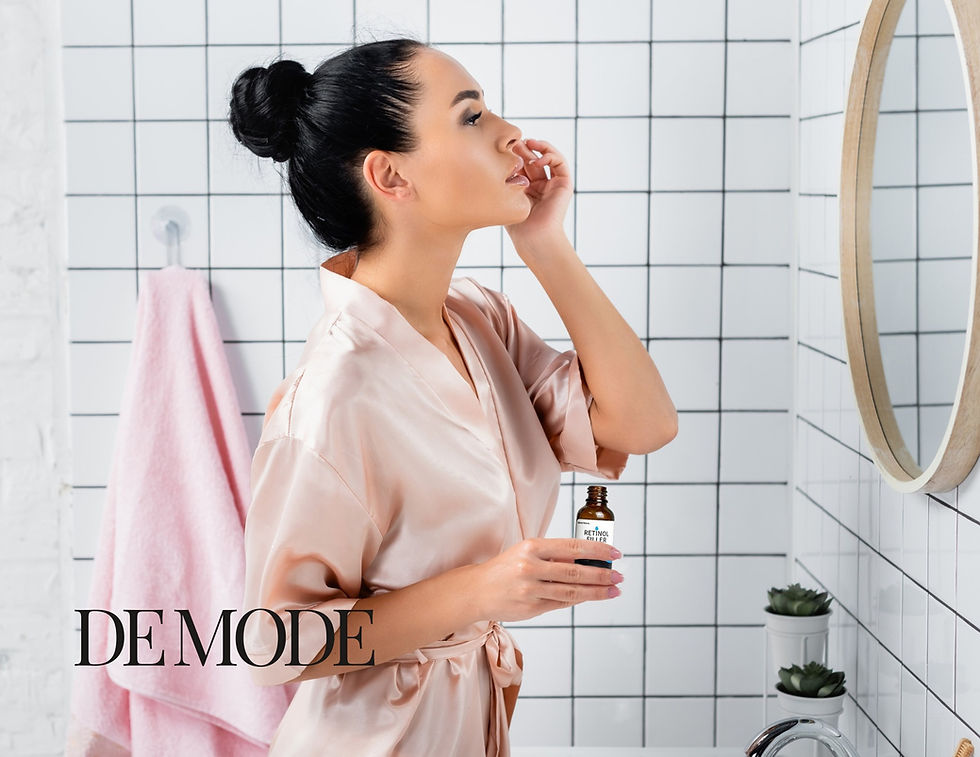ORIGINALLY PUBLISHED IN DE MODE
Article Published on: 11TH JULY 2023 | www.demodemagazine.com
Retinol, a derivative of vitamin A, has long been hailed as a powerhouse ingredient in the world of skincare. Renowned for its ability to address multiple skin concerns, retinol is a versatile ingredient that offers remarkable anti-aging and acne-prevention benefits. In this article, we will delve into the power of retinol and explore how it can transform your skin.
Stimulates Collagen Production
Collagen, a protein responsible for maintaining the skin's structure and elasticity, naturally declines with age. This decline leads to the formation of wrinkles, fine lines, and sagging skin. One of the key benefits of retinol is its ability to stimulate collagen production in the skin.
When applied topically, retinol penetrates the skin and promotes the synthesis of collagen fibers. Increased collagen levels help to improve skin firmness, reduce the appearance of wrinkles, and restore a more youthful complexion. Regular use of retinol can contribute to smoother, plumper, and more resilient skin over time.

Diminishes Fine Lines and Wrinkles
Fine lines and wrinkles are common signs of aging that many individuals seek to combat. Retinol is highly effective in minimizing the appearance of these visible signs of aging.
Retinol works by accelerating cell turnover, which helps shed the outer layer of dead skin cells and reveal fresh, new cells beneath. By encouraging faster cell renewal, retinol helps to smooth the skin's surface and diminish the appearance of fine lines and wrinkles.
Additionally, retinol promotes the production of hyaluronic acid, a natural substance that retains moisture in the skin. Hydrated skin appears plumper and more youthful, further reducing the visibility of fine lines and wrinkles.
Improves Skin Texture and Tone
Uneven skin texture and tone can be attributed to various factors such as sun damage, acne scars, or hyperpigmentation. Retinol is a valuable tool in improving these skin concerns.
Retinol's exfoliating properties help to remove the build-up of dead skin cells on the surface, leading to a smoother and more refined texture. With consistent use, retinol can contribute to a smoother complexion and a reduction in rough patches or uneven areas.
Furthermore, retinol is known for its ability to fade dark spots, acne scars, and hyperpigmentation. By inhibiting the production of excess melanin, the pigment responsible for skin discoloration, retinol helps to even out the skin tone and restore a more balanced complexion.
Prevents and Treats Acne
Beyond its anti-aging benefits, retinol is highly effective in preventing and treating acne. Acne occurs when hair follicles become clogged with oil, dead skin cells, and bacteria, leading to inflammation and breakouts. Retinol addresses acne in several ways.
First, retinol helps to regulate oil production in the skin, preventing excessive sebum buildup that can contribute to clogged pores. By keeping the pores clear and minimizing oiliness, retinol reduces the likelihood of breakouts.
Additionally, retinol's exfoliating properties help to unclog pores and remove dead skin cells, preventing the formation of comedones (blackheads and whiteheads). This exfoliation process promotes a smoother complexion and reduces the occurrence of acne.
Moreover, retinol has anti-inflammatory properties that help soothe redness and inflammation associated with acne. It can also help fade post-inflammatory hyperpigmentation (PIH), the dark spots that often remain after acne has healed.

Gradual and Consistent Approach
When incorporating retinol into your skincare routine, it's important to start slowly and gradually increase usage. Retinol can cause initial skin sensitivity, redness, or flaking, especially if you have never used it before. Begin by applying retinol once or twice a week, gradually increasing the frequency as your skin adjusts.
It's also crucial to use retinol in the evening as it can make the skin more sensitive to sunlight. Pairing retinol with broad-spectrum sunscreen during the day is essential to protect your skin from potential sun damage.
When selecting a retinol product, consider the concentration of retinol and choose one suitable for your skin type and sensitivity level. If you have particularly sensitive skin, you may opt for a lower concentration or start with a gentle retinol derivative like retinyl palmitate.
Complementing Skincare Routine
Retinol is most effective when used in conjunction with a well-rounded skincare routine. Pairing retinol with moisturizers and serums that contain hydrating and soothing ingredients can help counteract potential dryness or irritation.
It's essential to ensure your skin is adequately moisturized when using retinol to maintain a healthy skin barrier. Look for moisturizers containing hyaluronic acid, ceramides, or niacinamide, as they provide hydration and help strengthen the skin's protective barrier.
Using a gentle cleanser and avoiding harsh or drying skincare products can also help maintain a balanced and healthy complexion while using retinol.

In conclusion, retinol is a potent skincare ingredient that offers numerous benefits for anti-aging and acne prevention. Its ability to stimulate collagen production, reduce the appearance of fine lines and wrinkles, improve skin texture and tone, and prevent and treat acne make it a valuable addition to any skincare routine. By incorporating retinol gradually and consistently, and complementing it with hydrating and soothing products, you can harness the power of retinol to achieve a more youthful, radiant, and healthy complexion.